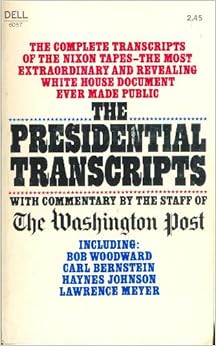One of the books in my library I have never read and never expect to read is The Presidential Transcripts, a transcription of the Nixon tapes that, perhaps more than anything, forced President Nixon to resign. Countless copies of this book were sold back in the 1970s -- my copy was part of the third printing -- but I can't imagine anyone reading all 693 pages who didn't have to.
I took the book down from its shelf this week after reading what Steven Pinker says about it in The Language Instinct. Pinker writes that the Nixon transcripts shocked Americans in three ways. A few were shocked that the president had taken an active part in covering up a crime. A few more were shocked that "the leader of the free world cussed like a stevedore." But what shocked most people was how difficult to read transcribed conversation can be. Surely Richard Nixon, John Dean, H.R. Haldeman and the others understood what they were talking about, but understanding what they said by reading it can be a challenge.
One of group of people who, better than most others, could understand the transcripts were journalists, Pinker says. That's because journalists must, as part of their job, train themselves to convert ordinary speech into a written form that anyone can understand.
Listen closely to a conversation and you will discover that people tend to talk in incomplete sentences, throwing in a lot of "uhs," "likes" and "you knows." They also use a lot of facial expressions and gestures that are impossible to put into a transcription. Simply the manner in which something is said tells a listener whether the speaker is serious, sarcastic or whatever. You can't always tell when those words are put down on paper.
Yet reporters are expected to insert direct quotes into their stories. That can mean converting jumbled, incomplete sentences into something readers can understand while still being faithful to what the news source said. During my days as a reporter I once had a city council member tell me, "You know what I mean. Put it in your own words." While I appreciated his vote of confidence, I was not about to make up a quote just to have one. Polishing a quote and making it read better than it otherwise would have is another matter, however. Journalists do that all the time, although sometimes I'm sure they take too many liberties with their quotes.
Pinker recalls when former Red Sox pitcher Roger Clemens complained the Boston Herald always misquoted him. So the newspaper started reproducing the ball player's postgame comments word for word, making Clemens look ridiculous in the process.
Clemens, Nixon, Haldeman, et al, were not alone. Most of us would be embarrassed if our everyday speech were put into writing and distributed to the world.

No comments:
Post a Comment